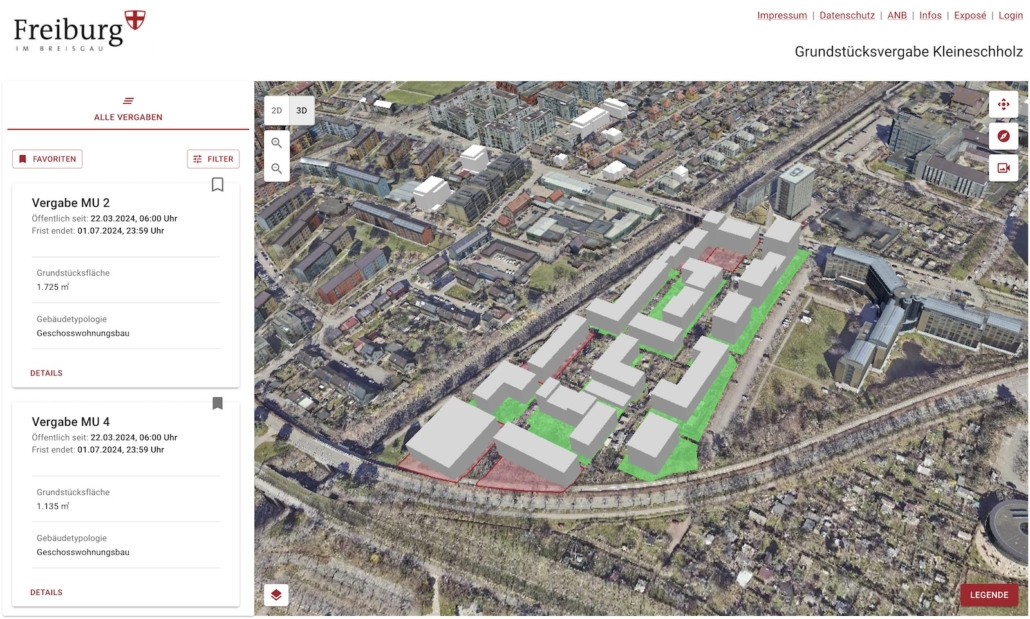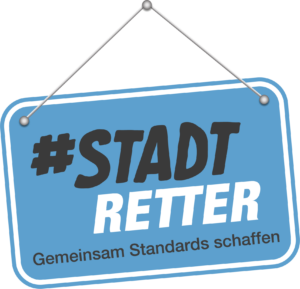Concept allocation
Marketing of municipal properties according to the quality of the submitted concept and sustainability criteria
Background
Local authorities have a social responsibility to promote social housing and the development of sustainable urban neighbourhoods. However, this can only succeed if the local authority has other control functions in addition to the instruments provided by building law. One exciting instrument here is the so-called concept allocation, where a property is not awarded at the highest price or directly to an interested party, but the award is dependent on the submitted applicant concept.
A concept allocation entails a high level of administrative effort and is a very dynamic and complex process in which various stakeholders are involved. The submission of applications, the evaluation, the award decision and the awarding of the contract have generally taken place in analogue form in concept awards to date.
What are concept allocations and why should local authorities
Concept allocation: An explanation
Providing people with socially acceptable housing is one of the core tasks of every city and municipality. In order to create affordable housing, local authorities need the corresponding room for manoeuvre, which they traditionally exercise by means of building and planning law instruments such as the creation of a development plan. However, the price of land is currently a significant cost factor in the construction of housing. Due to the limited supply of building land, it is difficult to find an investor who will realise affordable housing through traditional bidding processes. This often results almost exclusively in high-priced condominiums that are not in the interests of the local authority. The allocation of properties at the highest prices therefore leads directly to high rents or property prices.
This price spiral can be broken with concept allocations. The aim is not to award a property to the highest bidder, but to the bidder who presents the best utilisation concept. In addition to social and public welfare aspects, sustainability criteria – such as how much grey energy is bound – or the overall view of a neighbourhood are increasingly playing a role. The contract is therefore awarded in the form of a competitive procedure based on the quality of the concepts submitted, assessing the fulfilment of social, ecological and urban planning criteria.
High administrative costs
However, the awarding of concepts also entails a considerable amount of administrative work. Specifications have to be drawn up, invitations to tender designed, application deadlines specified and, finally, submitted concepts evaluated and analysed. In addition, a basis for decision-making must be prepared for the political committees and, if necessary, improvements to the concepts must be requested from the applicants. In a survey conducted by immovativ GmbH in June 2022, 94 per cent of the municipalities surveyed stated that they found the process of awarding concepts to be time-consuming to very time-consuming. Nevertheless, more and more municipalities are turning to concept awards as part of building land developments in order to develop sustainable neighbourhoods. Building land is often allocated as part of a heritable building right.
Short
Concept awards are an instrument of land marketing alongside maximum price procedures and direct awards at market price. In Germany, they serve as a means of shaping municipal urban planning and support the achievement of neighbourhood development objectives alongside the instruments of building law.
Further links

Domagkpark München, Bildquelle: Wikipedia, Lumor2020, CC BY-SA 4.0
In Munich, the Domagkpark neighbourhood on a former radio barracks was developed as part of a concept award. Co-operatives, building cooperatives and property developers were able to apply. The result is a lively residential neighbourhood that thrives on its mix of residents.
In Stuttgart, the Olga-Areal was developed with three parallel concept awards for different target groups. The decisive factor was the allocation of individual building plots to anchor users, who were responsible for the construction of the communal underground car parks and inner courtyards and simultaneously took on the role of project manager.
The following points in particular became clear:
- 94.1 per cent of the municipalities surveyed consider the process of concept awards to be time-consuming or very time-consuming.
- 66.7 per cent of the municipalities surveyed are satisfied with the result of the concept award.
- 55.6 per cent of the municipalities surveyed are satisfied with the transparency of the process.
- 50.0 per cent of the municipalities surveyed associate the concept award with an analogue process.
- Almost all of the municipalities surveyed receive applications by post or email.
- Concept awards can only be carried out in co-operation with different specialist departments.
- The majority of the municipalities surveyed would like a digital tool to be able to process concept awards in a structured manner and to digitalise the application process.
The biggest challenge with concept awards, in addition to the preparation and publication of the award documents, is the handling of incoming applications. If this process is digitalised to a large extent, this saves on personnel costs and creates transparency for applicants.
It is important to design a digital platform in such a way that both interested parties can obtain information in a public area and applicants can download, process and submit specific tender documents. Applicant questions should be recorded in as structured a manner as possible to enable comparability and evaluation.
In cooperation with Symbiolab GmbH from Berlin, immovativ GmbH was awarded the contract to develop a digital platform for concept marketing in April 2023. Building on an MVP (which had already been developed in a previous project), the requirements for the platform were honed and technically implemented in close consultation with a project group from the city. The aim was to use this platform to market the new Dietenbach district. Housing for up to 16,000 people will be built here in the coming years.
During the course of the project, the decision was made to use the platform for a current project, the Kleineschholz area in Freiburg’s Stühlinger district. Around 500 residential units are being built here in an urban residential neighbourhood. The marketing platform went online at https://kleineschholz.freiburg.de in time for the marketing launch on 22 March 2024. Interested parties can use a map-based public area to find out about the awards and start an application process for individual building plots after registering on the platform. Documents such as planning data or profiles as well as forms can be downloaded and submitted later. The digital recording of framework parameters for the submitted concepts allows those responsible in the city to carry out a digital (statistical) evaluation. It is possible to communicate with applicants via the platform and, for example, request additional documents and prepare data for municipal decision-making bodies. The subsequent awarding of the contract and the recording of potential successors is also mapped via the platform.
Marketing platform of the city of Freiburg for the Kleineschholz project.
Successful building land marketing with immovative software
Award platform for concept allocations
With an individualised awarding platform for your project, you enable a structured application and awarding process and receive all application documents in digital form. We would be happy to advise you and provide you with a non-binding offer.
Interactive presentation of building sites
In addition to a wide reach, the main focus is on a clear presentation and a unique depth of detail.
KIP | The municipal property platform
With KIP, local authorities and business development agencies can create their own locally or regionally focused property marketplace.




